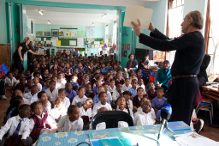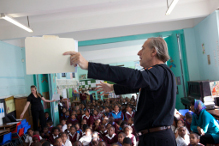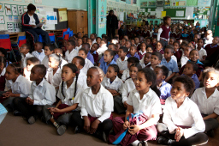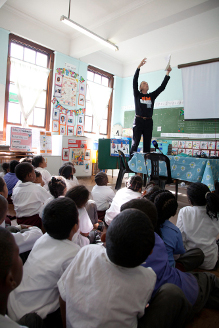
Ariel Dorfman reads to the students at Athlone North Primary School
July 21, 2010 – World-acclaimed Chilean-American author, human rights activist and distinguished professor of literature and Latin-American studies, Ariel Dorfman, landed in Cape Town this morning ahead of the Eighth Nelson Mandela Annual Lecture, which is taking place at Johannesburg’s Linder Auditorium on July 31, 2010.
Dorfman is in South Africa to participate in a number of events around the country which will focus on reaching out to students, writers and the public at large. His visit will culminate in the Eighth Nelson Mandela Annual Lecture.
His first stop was to show his support for Mandela Day by giving 67 minutes of his time at Athlone North Primary School in Kewtown, Athlone, where a classroom full of Grade 1s and 4s eagerly awaited the prolific author and playwright.
Head of the Nelson Mandela Foundation’s Memory Programme, Verne Harris, introduced Dorfman to the children. He said, “The very first thing that [Ariel Dorfman] is doing in South Africa is to come and share a story with you; he’s doing this for [the Nelson Mandela Foundation], for us, and for Madiba.”
Dorfman began by gesturing to the books in the room and pointing out that these do not “grow on trees like leaves”, but instead must be written by someone. “I am a writer of books like these,” he said.
The children were riveted as an animated Dorfman, clearly a deft storyteller, began his tale with those magic words, “Once upon a time … ”
He related the story of The Rabbits’ Rebellion, a clever allegory on oppression and censorship that traces the efforts of a wolf king, who insists that rabbits simply do not exist. To prove his point, the wolf king removes all references to rabbits from books and also enlists a monkey photographer to take pictures around the town, being careful to remove all traces of rabbits from the photographs with “a special acid”.
But the rabbits refuse to be ignored. Frustrated, the wolf king decides to build a tower too high for the rabbits to reach, but his plan is thwarted and he falls from his tower.
Dorfman explained the theme of his story to the children afterwards, pointing out that “A man with a lot of power decided that some people don’t exist. This is a lot like what happened in your country. It’s always good to be rebellious. … But not disobedient at school,” he added with a grin.
Dorfman then took time to show the children maps of various countries where The Rabbits’ Rebellion has been published in the languages of those countries. He offered a translation of The Rabbits’ Rebellion in Spanish and French to illustrate this. To involve the children, he related the various countries to the 2010 FIFA World Cup™, and there was rapturous applause from the little ones when he mentioned Brazil, Italy and France.
The children were then invited to ask questions. “How did you become a writer?” asked one Grade 4 learner.
“When I was a little boy,” answered Dorfman, “I couldn’t stand still for long and I’d run around all the time. In fact, I couldn’t read or write until I was seven years old! But when I was about five or six, I had puppets and I invited all the neighbours around to see what stories I came up with.
“My mother taught me to read and write, and basically I couldn’t stop writing [once I started].
“I wouldn’t have been invited to deliver the Annual Lecture if I only wrote children’s books, but you are the most important people I’ll meet on this trip,” he told the children.
The second question came from a Grade 1 learner: “How long did it take you to write the book?”
“I wrote this in only one night,” Dorfman said, “but it took me many years of thinking.”
Tyrone Adams, in Grade 1, stood up and said that he wants to be a writer. How does he go about becoming one, he asked.
“Every morning, I wake up with something in my head,” began Dorfman. “Writing is like an itch that you have to scratch. And sometimes you ask yourself, ‘How can I give other people this itch? I’ll write something about it!’”
Dorfman then launched into a story-making game with the learners, a game that he plays with his own grandchildren. The result was a yarn about a cat, a dog and a rabbit who live in a haunted house and must give the house’s resident ghost access to Michael Jackson and Cristiano Ronaldo. The children whooped with delight as Dorfman came to the climactic ending, animal-sounds and all.
Athlone North Primary School’s principal, Beverly Daniels, stressed that the children of Athlone are not exposed to the written word very often. “Today is the first time that they met an author; they were exposed to the real McCoy, and a good one as well!”
In response, Dorfman expressed his gratitude: “This was my Mandela Day activity, so I should be thanking you!”
While giving out bear hugs to the learners, Dorfman offered inspirational words: “There’s nothing you can’t do!”
The Rabbits’ Rebellion by Ariel Dorfman was first published in Argentina in 2001.
Following his Mandela day activity Dorfman held a press conference at Mandela Rhodes Place in Cape Town.


